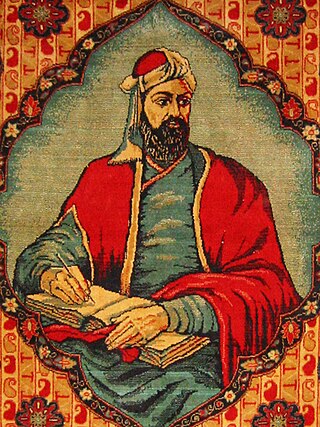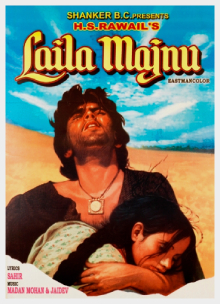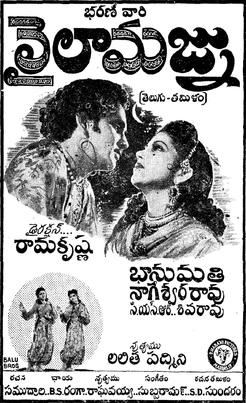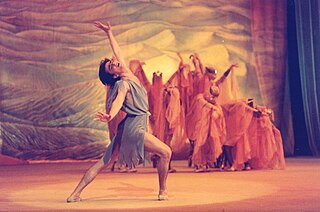Majnu often refers to Layla and Majnun , a romantic narrative poem by the Persian poet Nizami Ganjavi.
Contents
Majnu or Majnun or Majnoon (transl. madman; lit. 'possessed by the jinn' in Arabic) may also refer to:
Majnu often refers to Layla and Majnun , a romantic narrative poem by the Persian poet Nizami Ganjavi.
Majnu or Majnun or Majnoon (transl. madman; lit. 'possessed by the jinn' in Arabic) may also refer to:

Nizami Ganjavi, Nizami Ganje'i, Nizami, or Nezāmi, whose formal name was Jamal ad-Dīn Abū Muḥammad Ilyās ibn-Yūsuf ibn-Zakkī, was a 12th-century Muslim poet. Nezāmi is considered the greatest romantic epic poet in Persian literature, who brought a colloquial and realistic style to the Persian epic. His heritage is widely appreciated and shared by Afghanistan, Republic of Azerbaijan, Iran, the Kurdistan region and Tajikistan.
Arabic literature is the writing, both as prose and poetry, produced by writers in the Arabic language. The Arabic word used for literature is Adab, which is derived from a meaning of etiquette, and which implies politeness, culture and enrichment.
"Layla" is a 1971 song by Derek and the Dominos.

A Punjabi Qissa is a tradition of Punjabi language oral story-telling that emerged in South Asia with the fusion of local Punjabi people and migrants from the Arabian peninsula and contemporary Iran.
Marwa may refer to:

Layla and Majnun, also spelled as Leili-o-Majnun or Laili-o-Majnoon, is a 1937 Iranian romance film produced in 1937 by Abdolhossein Sepanta by the East India Film Studios.
Junoon may refer to:

Laila Majnu is a 1976 Indian Hindustani-language romantic drama film directed by Harnam Singh Rawail and starring Rishi Kapoor, Ranjeeta and Danny Denzongpa in lead roles. The film's music is by Madan Mohan and Jaidev. Based on the legend of Layla and Majnun, it tells the story of two star-crossed lovers: Laila, a princess and Qais a.k.a. Majnu, a common man.

Marwah wa al-Majūn al-Faransi is a classical Middle Eastern love story. It is based on the legend of a young man named Shams al Faransy from Central Asia, born during the 14th century. There were many Arabic versions of the story at the time.
Leila is a feminine given name primarily in the Semitic and Iranian languages. In Latin alphabet the name is commonly spelled in multiple ways, including Leila, Layla, Laylah, Laila, Leyla and Leylah.

Laila Majnu is a 1949 Telugu-language historical romance film, based on the Sufi legend of Laila-Majnu. It is produced and directed by P. S. Ramakrishna Rao under the Bharani Pictures banner. It stars Akkineni Nageswara Rao and Bhanumathi, with music composed by C. R. Subburaman. The film was simultaneously released in Tamil with same title. The film was successful at the box office.

Layla and Majnun is an old story of Arab origin, about the 7th-century Arabic poet Qays ibn al-Mulawwah and his lover Layla bint Mahdi.

Laila Majnu is a 1962 Indian Malayalam-language romance film, directed by P. Bhaskaran, based on Layla and Majnun. Starring Prem Nazir and L. Vijayalakshmi, with Sathyan, Thikkurissi, T. S. Muthiah, Chandni, Adoor Bhasi and Kodungalloor Ammini Amma in supporting roles, the film's acclaimed music was composed by Baburaj. Egyptian dancer Laila appeared in one of the songs.
Layla and Majnun is a classical Arabic story.

Laila Majnu is a 1950 Indian Tamil-language historical romance film directed by F. Nagoor. Based on the Persian tale of Layla and Majnun, the film stars T. R. Mahalingam and M. V. Rajamma as the title characters. It was released on 1 March 1950.

Leyli and Majnun a classic Azerbaijani story of love couple; it is a one-act ballet by Azerbaijani composer Gara Garayev. The libretto is based on Nizami Ganjavi's poem Layla and Majnun. The choreographer of the original production was Nelya Nazirova. The premiere, conducted by R. D. Abdullayev, took place on 25 May 1969 at the Azerbaijan State Academic Opera and Ballet Theater in Baku, with V. N. Pletnev as Majnun and T. N. Mamedova as Leyli. Nazirova's production was the basis of the ballet film In the World of Legends that was filmed by the creative association Ekran in 1975.
Love Story or A Love Story may refer to:
"Layla and Majnun" is the third poem of the classic of Nizami Ganjavi. This poem is included in "Khamsa" and was written in 1188 in Persian. It is based on the story of the ancient Arabic legend "Layla and Majnun" about the unhappy love of the young man Qays, nicknamed "Majnun", towards beautiful Layla. The poem is dedicated to Shirvanshah Ahsitan I, and was written on his order. There are 4600 stanzas in the poem. This poem is considered as the first literary processing of the legend.

Leyli and Majnun is an epic poem written in Azerbaijani by the 16th-century poet Fuzuli. The poem, written in the form of a mathnawi, tells the story of a young man named Qays who falls in love with a girl named Leyli and earns the nickname "Majnun" because of his love for her. The poem, considered the pinnacle of Fuzuli's creation, consists of 3096 beits and was dedicated to Üveys Pasha, the Ottoman ruler of Baghdad. In 1908, Uzeyir Hajibeyov composed the first opera in the Islamic world based on this work of Fuzuli.
Qays wa Laila is an Egyptian film released in 1960.